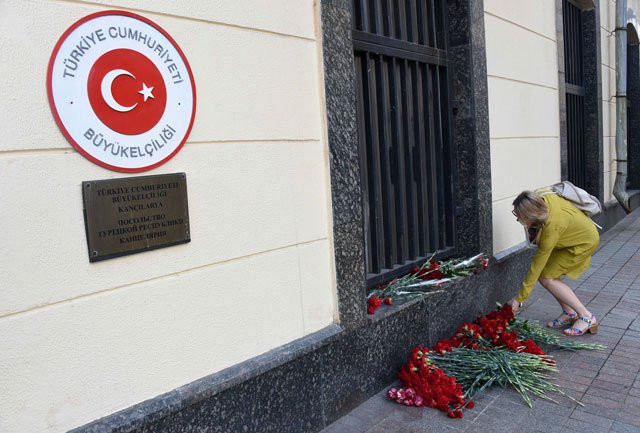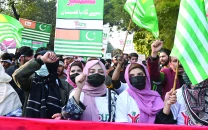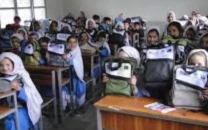Istanbul terrorist attack: Was Turkey napping?
Turkey’s dilemma is the western connivance with Russia in pushing Iraq and Syria into further chaos

A woman lays flowers in front the Turkish embassy in Moscow on June 29, 2016 as people pay tribute to the victims of Tuesday's suicide bombings at Istanbul's Ataturk airport. PHOTO: AFP
Counterproductive reporting gags were imposed after Tuesday’s attack, directly serving to fuel the rumour mill. Ankara resorts to imposing a media ban whenever it deems fit, whether it’s a financial scandal or a terrorist attack. Expectedly, social media has been amplifying the scale of terror attacks to the advantage of perpetrators. But Turkish media reports the suicide bombers were Uzbek, Kyrgyz and Russian (Daghestani) nationals.
PIA offers to fly Turkish Airlines passengers following terror attack at Istanbul airport
Ankara’s preliminary probe points to Islamic State of Iraq and Syria (ISIS) which sent three suicide bombers, two of whom were reportedly from Central Asian republics. The deadly militia, controlling swaths of lands in Iraq and Syria, is a lethal blend of Saddam loyalists and Muslim extremists who flourished due to sectarian policies and the incompetence of Iraq’s Haider al-Abadi and Syria’s Bashar al-Assad. Critics believe lack of action from countries such as Turkey and its NATO allies against both the faltering regimes has resulted in a power vacuum, giving way to extremist militias, which has resulted in the rise of ISIS.
Despots, armed non-state actors and fierce regional hegemonies such as Russia and Iran seize power in Turkey’s volatile southern neighbourhood. Since the second Iraq war, the country has been gradually drifting into multi-layered chaos. Hasty withdrawal of US troops has further added fuel to the fire.
The uprising against the Syrian dictator, belonging to hard-line Nusehri sect, began after Tunisians toppled Ben Ali and Egyptians ousted Mubarak. Turkey made multiple diplomatic efforts to woo Assad into announcing meaningful political reforms, but to no avail. Many criticise Ankara for opting to take a more straightforward approach rather than a diplomatic one which entailed withdrawing embassy staff and announcing full support for the opposition.
Istanbul attackers 'from Russia, Uzbekistan and Kyrgyzstan'
Ankara now hosts over three million Syrian refugees who have been fleeing excessive use of force by Assad’s military, including chemical and biological weapons on numerous occasions. Syria became Turkey’s internal issue almost along the same lines as Afghanistan has been for Pakistan.
Erdogan’s critics assume Ankara has other choices. Thus far, armchair analysts and his uncharismatic political opponents both have not been able to present alternatives. They sit silently while despot and foreign mercenaries massacre people to quell dissent.
Pragmatically speaking, Erdogan chose the best of the worst options available. The tragedy, however, is that he gradually evolved from a grassroots democrat to a frowning dictator. Though marred by pre-poll and media manipulation, he has used the electoral process more than once to reaffirm his public support.
The ruling party, Justice and Development Party (AKP), has also managed to maintain control over the military, which constitutionally is bound to safeguard the secular nature of the state. A majority of media houses either belong to ruling party sympathisers or are controlled by state-appointed caretakers.
Sadly, Turkey’s polity is devoid of an Erdogan challenger who is clean, creative and popular at the same time. The country’s deadwood opposition politicians bear ugly scars of corruption and bigotry on their faces.
Hrithik Roshan was at Istanbul airport hours before deadly suicide bombings
The Turkish leader is criticised for not doing enough to halt the movement of Daesh supporters across its borders. Though inward movement of militants from Europe and Africa has been checked, many still disguise themselves as hapless Syrian refugees to enter and leave via the country’s southern borders.
Turkey’s dilemma is the western connivance with Russia in pushing Iraq and Syria into further chaos. A political solution has never been a priority for America and Russia. While Turkey has fenced much of its border with Syria, it is engaged in bloody battles with ISIS and Kurdish militants along its border with Iraq.
Turkey has become increasingly vulnerable to terrorist attacks. Prior to Brexit, Brussels’ key concern was to assign Ankara the role to halt the influx of Syrian refugees into Europe. The European Union and Turkey have not been on the same page over this issue despite a deal reached months ago.
Istanbul manifests hope and prosperity for the developing world. Despite random attacks against soft targets, the metropolis is safe. Reporting gags, politicisation of intelligence agencies and rash policies can’t help Turkey cull the monster of terrorism.
Naveed Ahmad is a Pakistani investigative journalist and academic with extensive reporting experience in the Middle East and North Africa. He is based in Doha and Istanbul. He tweets @naveed360.



















COMMENTS
Comments are moderated and generally will be posted if they are on-topic and not abusive.
For more information, please see our Comments FAQ